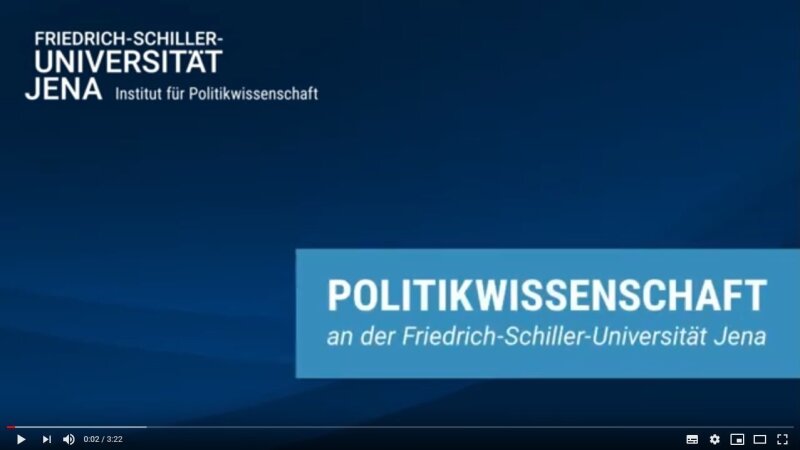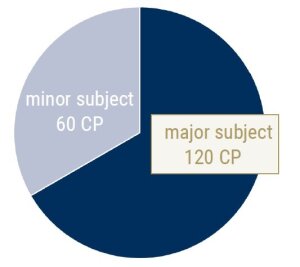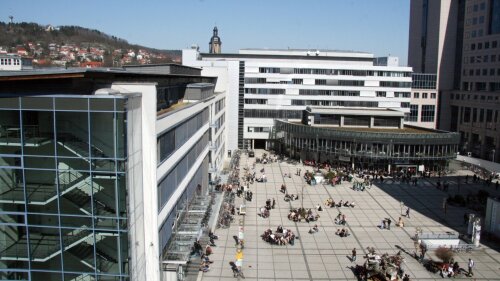
- Degree
- Bachelor of Arts
- Supplement to degree
- major in a multi-subject bachelor’s programme
- Admission restriction
- without admission restriction (without NC)
- Duration
- 6 Semesters
- Credits/ECTS
- 120
- Teaching language
- German
- Tuition fee
- None
- Semester contribution
- € 272,80
- Start of studies
- Winter semester
- Part-time possible
- Yes
- Institutions
- Faculty of Social and Behavioral Sciences
- Institute of Political Science
More detailed information can be found in the module catalogue for the study programme [in German]External link.
- Wide range of topics: During your studies, you can set your own focus and study the topics that really interest you.
- Excellent teaching: Are you looking for personal supervision, work in small seminar groups, modern and interactive seminar forms, action-oriented projects and a variety of excursions? If so, the Institute of Political ScienceExternal link at the University of Jena is the right choice for you.
- High practical component: The programme in Political Science in Jena is oriented towards the promotion of skills that prepare you for the labour market. Through a variety of topical events, we also keep you in close touch with German and international politics and practice.
- International orientation: The Institute of Political ScienceExternal link maintains ties with many international universities and exchange programmesExternal link. You sit in seminars with international students, can study abroad and enhance your foreign language skills.
-
University entrance qualification
A university entrance qualification, such as a general secondary school leaving certificate, is required for admission onto the study programme.
More information on university entrance qualifications can be found here.
-
Language requirements
English and another modern foreign language; proof to be submitted by the time the bachelor thesis is registered.
sufficient reading comprehension in English to participate in advanced modules (POL 310–351).
Admission and language requirements for applicants of foreign nationality and without German Abitur: www.uni-jena.de/en/study-orientation-international
Carl-Zeiß-Str. 3
07743 Jena
Google Maps site planExternal link
Carl-Zeiß-Platz 1
07743 Jena
Opening hours:
Please contact us via the remote help desk or by telephone.
Telephone hours:
Mondays and Fridays (9:00 – 11:00)
Wednesdays (13:00 – 15:00)
The ASPA is primarily responsible for students in the Faculty of Social and Behavioural Sciences, the Faculty of Arts and Humanities, and the Faculty of Theology.
Carl-Zeiß-Str. 3
07743 Jena
Google Maps site planExternal link
University Main Building / SSZ
Fürstengraben 1
07743 Jena
Google Maps site planExternal link
Office hours:
We offer consultations in person, by telephone, and via Zoom. You can make an appointment by calling us on +49 3641 9-411111 (Mondays to Fridays from 9:00 to 11:00) or outside these office hours on +49 3641 9-411200. You can also use our remote help desk.
Consultation hours:
Mondays, Tuesdays, Thursdays and Fridays (9:00 to 12:20), Tuesdays (14:00 to 18:00), and Wednesdays and Thursdays (14:00 to 16:00).
Video chat: Zoom – Video chat Videochat ZeitenMondays to Fridays (12:30 to 13:00) Password ZSB2020 Data protection informationpdf, 183 kb
University Main Building, Room E065
Fürstengraben 1
07743 Jena
Google Maps site planExternal link
Opening hours:
Mondays (10:00 – 12:00)
Tuesdays (13:00 – 15:00)
Wednesdays (10:00 – 12:00)
Thursdays (13:00 – 15:00)
Fridays (10:00 – 12:00)
You can also use our remote help desk at
www.uni-jena.de/service-ssz
or send us your enquiries by post.
Telephone hours:
Mondays to Fridays
(9:00 – 11:00)
Postal address:
Friedrich-Schiller-Universität Jena
Studierenden-Service-Zentrum
07737 Jena
University Main Building
Fürstengraben 1
07743 Jena
Google Maps site planExternal link



